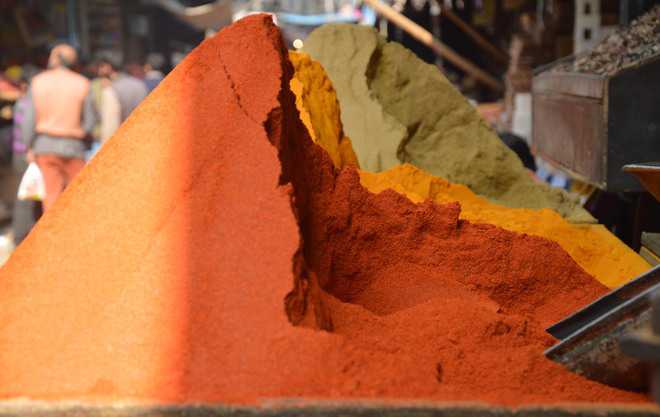
Manav Mander
Tribune News Service
Ludhiana, February 10
A Punjabi dish is never complete without a dash of spice, which not only adds flavour, aroma and taste to any dish, but also changes the look and colour of food.Spices are composed of antioxidants, minerals, vitamins, phyto-nutrients, and essential oils, necessary for our wellness but little does a homemaker cooking in the kitchen knows that even spices can be adulterated.Spices available in the market are often adulterated. In the name of spices, one may actually be consuming ‘slow poison’ that can have an adverse effect on health in the long run if consumed regularly.Be it turmeric, black pepper, red chilli powder, coriander powder or saffron, everything is being adulterated by unscrupulous elements to earn some quick bucks. Adulteration is done to add weight to a product or enhance its colour.Harmful ingredients such as coloured crushed rice husk, and crushed wood were also used to increase the net weight of the packets.Turmeric powder or haldi is an indispensable spice in Indian and many Asian cuisines. But artificial colours and fillers such as corn flour (starch) yellow coloured talk or sawdust, lead chromite (used in paint), or melanil yellow are often used. Adulteration causes stomach disorder.Red chilli powder may be mixed with brick powder, saw dust, and artificial colours; these adulterants cause cancer and stomach disorders.Mustard powder (sarson) is mixed with argemone seeds. These adulterants cause epidemic dropsy and glaucoma.Black pepper powder (kali mirch) may be mixed with papaya seeds and light berries, which cause liver problems and stomach disorder.Cumin seed (zeera) and poppy seed (khaskhas) may contain artificially coloured foreign seeds, which are highly injurious to health.Asafoetida (hing) often comes mixed with foreign resins galbanum and colophony resin. These cause dysentery.Coriander powder (dhania) commonly used in Indian curries may be mixed with sawdust.Common salt is often found to be adulterated with white powdered stone, chalk and talc.Saffron (kesar) by weight is the most-expensive spice in the world. These can be made of coloured gelatine strands or stretched with dyed maize filaments (corn silk).“Turmeric powder is commonly found to be adulterated. People generally do not know that the turmeric powder they are using is adulterated. It is highly risky to consume turmeric powder mixed with metanil yellow. It is purely carcinogenic,” said Dr Deepak, a city-based gastroenterologist.Some people use turmeric in higher doses daily for health maintenance or for medicinal doses. These can vary from half a teaspoon to a tablespoon daily, but instead of giving you health benefits, it can result in damage.
Test yourself
- Cumin powder: Take a small amount (1/4 to 1/2 teaspoon) cumin powder and sprinkle it in a glass of water. The spice will sink and the sawdust will float.
- Pepper powder/ peppercorns: Take a small sample of peppercorns and drop them in a glass of water. The peppercorns will drop to the bottom and the papaya seeds will float. For ground pepper, the test is similar. If sawdust or ground papaya seeds are present, they will float.
- Saffron: Drop a few strands in cold water. If you see the colour quickly and the strands appear a little gummy when rubbed with fingers, it is gelatine. Real saffron will continue to release its colour in water. And there is no scent.
- Turmeric: In a small container such as a shot glass or mini bowl, place a small amount of turmeric. Add a little alcohol, stir well or cover well and shake (test tubes are good for this). Then add good shot of an acid such as vinegar. If it turns pink or violet, it has been adulterated.
- Salt: Stir a spoonful of salt in a glass of water. The presence of chalk will make the solution white and other insoluble impurities will settle down.
The only solution
- Buy spices from reliable sources and be aware of the possibilities of spice adulteration and test it. Buy organic things when you can and look for trusted labelling or the best way is to return to traditional methods. Buy whole spice and grind or grate or crush on your own.
